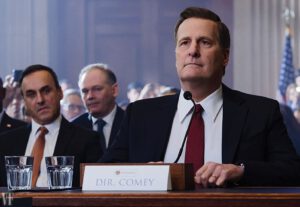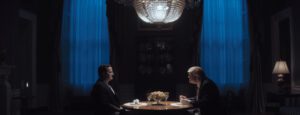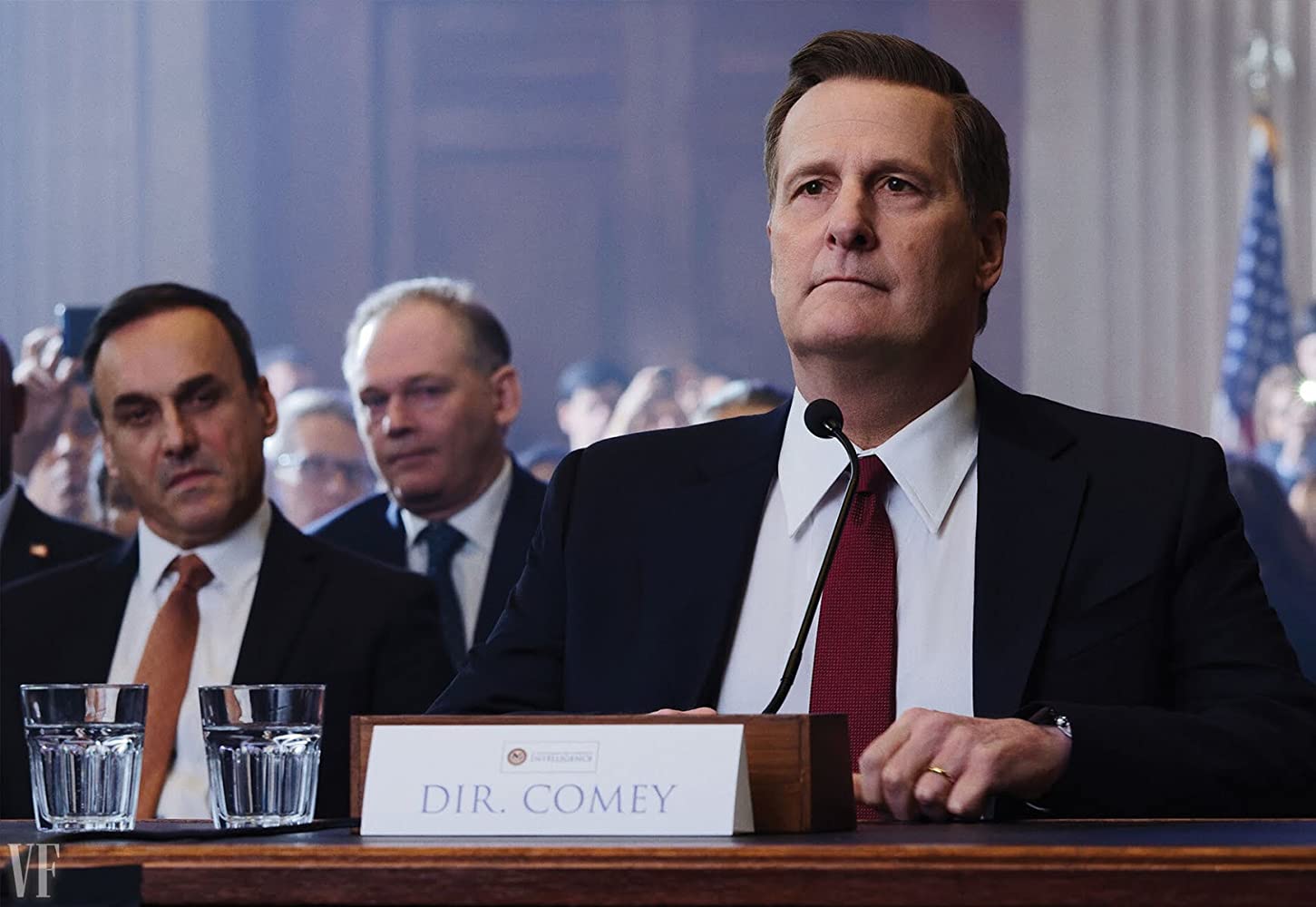Movie Info
Movie Info
- Director
- Billy Ray
- Run Time
- 1 hour and 55 minutes
VP Content Ratings
- Violence
- 0/10
- Language
- 1/10
- Sex & Nudity
- 1/10
Relevant Quotes
O Lord, who may abide in your tent?
Who may dwell on your holy hill?
Those who walk blamelessly, and do what is right,
and speak the truth from their heart;
who do not slander with their tongue,
and do no evil to their friends,
nor take up a reproach against their neighbors;
in whose eyes the wicked are despised,
but who honor those who fear the Lord;
who stand by their oath even to their hurt
Many proclaim themselves loyal,
but who can find one worthy of trust?
The righteous walk in integrity—
happy are the children who follow them!
Part One
Running time: 1 hour, 35 min.
Our Content ratings for both: (1-10): Violence 0; Language 1; Sex/Nudity 1.

Director/writer Billy Ray’s two-part miniseries centering on relationship between FBI Director James Comey and President Donald Trump is a political junkie’s dream picture. Well for some it will be. It is based on former FBI Director James Comey’s tell-all book of the same name. Supporters of President Donald Trump will not like it. Did I write Trump supporters will not like it—that’s far too mild. They will hate it! Like David Copperfield, Comey (Jeff Daniels) becomes “the hero of his story,” and from what we see of the President (Brendan Gleeson), he is the villain, the kind of mob boss that not even Dickens could imagine.
Writer Billy Ray sets us up for what is to come by beginning with a Stephen Colbert clip in which he says he isn’t sure what to think of James Comey—the “Good Guy” or “the Bad Guy.” (I will leave it to you to discover what Harry Potter character he compares Comey to.) Then at the Justice Department Rod Rosenstein enters his new office and speaks to the aide about Comey, calling him a “showboat.”
We are transported back six years as Comey talks in the morning with his wife and daughters while getting ready to meet with the President at the White House. President Obama (Kingsley Ben-Adir) after talking with him about his views appoints him as FBI Director. The new Director is very intent on keeping his agency and the President at a distance so as to allow no hint that the Bureau’s integrity is being influenced by politics. President Obama agrees.
We meet a wide range of Bureau and DOJ staff members who also are determined that their work be nonpolitical. All are dedicated to protecting the nation and its people. The gaffes of the Clinton Presidential campaign are shown, the main one being Hillary’s husband’s infamous meeting with DOJ head Loretta Lynch (Michael Hyatt) when both of their planes had landed at the same airport. The supposedly smart Bill Clinton couldn’t have handed his wife’s opponents better ammunition to fire at his wife, if he had tried.
As in the book, we learn details of the Director’s handling of the FBI’s investigation of the ties of the Trump campaign with Russia, during which the Steele Dossier emerges. The film re-enforces the impression that the reports are true by brief shots showing Trump on the stairway of some elegant establishment and two women in short, form-fitting dresses. (No bedroom shots.) Candidate Trump assures the press and his supporters that he has had no dealings with Russia. The evidence discovered by the FBI agents reveal that this is a lie.
The spotlight turns upon Hillary Clinton when the FBI announces that it is investigating her emails from her days as Secretary of State, leaked by WikiLeaks, which, like the Russians, has an interest in defeating her. It eventually becomes clear there is no evidence of the former Secretary of State’s criminality that would stand up in court.
Comey decides, against the advice of some of his associates to do more than make an announcement of her clearance. He follows this up with an unprecedented statement of his strong disapproval of her practice, thus taking back with his left hand, what his right hand gave. There is no mention that Trump’s campaign is being investigated for its connection with Russia.
Then comes the startling revelation that more of Hillary’s emails have been discovered on the laptop of the husband of one of her associates! The announcement that the FBI is reopening its investigation of Hillary arouses consternation among Democrats and glee among Republicans. Someone drops the ball so that considerable time passes (with the election rushing upon them) before it is discovered no one has started examining them. An around-the-clock session by a room full of hard-pressed agents hurry through the more than 300 K messages. Just a few days before the election the FBI announces the same conclusion as before, but the damage to Hillary Clinton has been inflicted. The scenes of her electoral defeat are gloomy indeed, especially in the Comey household where his wife Patrice (Jennifer Ehle) and daughters have been shown as strong advocates of the former Secretary of Estate. The man they all love is being attacked on social media as the man who elected Donald Trump!
Donald Trump, except for a couple of brief shots, is a looming, but offscreen presence. The image of Comey conveyed is that of a man struggling to do the right thing, determined to keep himself, as well as his beloved Bureau, free of any hint of political bias. It is an impossible task. Just how much we will see in the second episode.
Part Two
Running time: 1 hour 55 min.
The second half begins suffused with the same mood of gloom and doom with which the first had ended. James Comey is called by some “The most hated man in America,” and his family feels that heat. One of them does not want to go to school. Although the several scenes showing her at school do not depict outright harassment, she definitely feels uncomfortable and under scrutiny. The mother and daughters are almost in tears, and the day after Trump’s inauguration, they join with the million other women who have come to Washington to demonstrate against the misogynist politician taking up residency in the White House.
Almost immediately Comey’s resolution to maintain a firm boundary between the Bureau and the White House is put to the test: unwelcome phone calls from Trump; a public call out in the Oval Office where high ranking officials and the press have gathered (Comey had desperately sought invisibility among the drapes on the far side of the Oval Office): and that now infamous dinner with, as Comey had feared, just the two of them present. Trump wants loyalty, and Comey replies that he will give “loyal honesty.”

On the way home from that private dinner Comey quickly texts into his Blackberry notes of what each had said. During further improper phone calls he writes furiously on his note tablet their remarks. Clearly, he is ensuring that he will have more than just his memory to depend upon when the time for reckoning comes. The other agents and officials are also worried about the President’s politicizing the Justice Department and his opposition of any investigation of his Russian connections.
Director Ray uses juxtaposition shots to great effect. Two examples: General Flynn denies he had spoken to the Russian diplomat, and then when proof is brought up that he has lied, he denies that they had talked about anything political–intercut are shots of him and the official doing exactly what he was accused of. At the beginning of one of Trump’s many calls to Comey the camera at first focuses upon a bust of “Honest Abe” and then upon Trump trying to get Comey to halt his investigation of alleged ties to Russia. At the end of the call, the lying Trump’s face is blurred as the camera focuses again upon Lincoln.
The film has been denounced by right wingers, both for its exposure of President Trump as a narcissistic tyrant always bragging about his fantasized achievements and because it is being released a month before the election. My main complaint is that there are so many important characters appearing, some just briefly, that I wish the identification appearing on the screen the first time could have been repeated occasionally. Too many times I wasn’t sure who was talking! The cast of characters is HUGE. Beginning with the most prominent because of his often-voiced criticism of Comey, there are: Deputy Attorney General Rod Rosenstein (Scoot McNairy); Sally Yates (Holly Hunter); Andrew McCabe (Michael Kelly); FBI agents Peter Strzok* (Steven Pasquale) and Lisa Page (Oona Chaplin), famous for their love affair and their scorn for Trump; General Michael Flynn (William Sadler); and Trump’s Attorney General, Jeff Sessions (Joe Lo Truglio); Robert Mueller (Peter Coyote); and, of course, the Comey daughters, and many, many more.
Of the depiction of the supporting characters that of Rod Rosenstein is perhaps second only to Trump’s in negativity. He seems to enjoy sneering at Comey’s habits, such as speaking with men and women of low-rank or having the family read the Declaration of Independence on the 4th of July. And yet the film shows sympathetically the man’s anguish when he realizes how he has been used by Trump in th-e unjust firing of Comey. He agonizes over this in the presence of McCabe, decrying his aloneness at the Bureau where he can trust no one. Now realizing how dangerous Trump is to the country, he even suggests out loud that he wear a wire to entrap the President so that then the Cabinet could invoke the 25th Amendment. The surprised McCabe leaves, asking if he can get back to him on this.
Comey himself comes across as a straight shooter very dedicated to serving the nation through his tenure at the FBI. He agonizes over the decisions he must make that will satisfy no one. The many scenes with his attractive family bring out his humanity, and the sad scene in which he is in California speaking to a group of agents emphasizes his victimhood. When he turns to see on the TV screen behind him the headline of his firing that the others are staring at, he keeps cool, never uttering the angry epithets that a man less in control of his emotions might spew out. He summarizes what he had wanted to say and then quickly leaves.
Late that night in the driveway of his home, as he parts from his chauffer for the last night, he embraces him when the man tells him he (Comey) deserved better (treatment). Comey tells him to go home to his family. Then he turns and finds a solemn faced Patrice waiting for him silently on the stoop. After a brief exchange they embrace, each of them barely holding back their tears.
The last few minutes of the show especially impressed me. An aide in Comey’s former office is packing some of his former boss’s books into a box just after Rod Rosenstein has made some disparaging remarks about Comey. He leaves the office, calling the fired Director for the second time “a showboat.” On the soundtrack we hear a man singing “America the Beautiful.” Comey and Patrice emerge from a restaurant, walk, and then stand for a moment looking up at the Justice Department Building (named after Robert Kennedy) where he had worked for so many years. (Throughout the series we are shown numerous times lofty quotes about law and justice chiseled high upon its face. The first is especially ominous, “Where law ends, Tyranny begins.”) Inside the building the camera pans along the line of staff with whom Comey had worked. Beneath each person we see words containing “fired,” “resigned” or “retired” (early). The hymn to America continues, and I suspect it is intentional that it began not with the first verse, but with the 3rd, which contains the plea, “May God they gold refine/Till all success becomes nobleness And every gain divine,” and then returns to more familiar first verse. The camera dissolves to the now empty FBI conference room, then shifts back to the Comeys and then the Capitol Dome in the distance as they cross the street. Superimposed on the screen is the message that according to U.S. Intelligence agencies, the Russians are active again interfering with the U.S. 2020 elections—and that the President has yet to acknowledge this. Dissolve to the Oval Office, the large chair behind the desk empty. This last sequence suggests to me that, in a sense, this whole movie can be seen as an elaboration upon the song, this part of it a prayer, “May God thy gold refine.” Clearly, from watching this film, we should be replacing the slogan “God bless America” with “God help America.”
Airs Sunday, September 27, and Monday, September 28, at 9 p.m. ET/PT on Showtime.
*Peter Strzok. As I write this the former chief counter-intelligence agent is very much in the news with the release of his book Compromised in the news and Rachel Maddow is interviewing him at the very moment I am writing this..
This review will be in the October issue of VP along with a set of questions for reflection and/or discussion. If you have found reviews on this site helpful, please consider purchasing a subscription or individual issue in The Store.
Showtime


Comey as a hero….well, why not? Maybe CBS can do John Wilkes Booth as a theater critic, they’re equally truthful.
Interesting observation. Thanks
Anything out of Hollywood I’d summarily dismiss as it will be decidedly one sided. It’s a vain attempt to derail the inevitable reelection of Donald Trump. He may be a narcissist but it’s all about substance over ceremony. The leftist Hollywood elite have no credence outside their own echo chamber.
I can’t agree. As to “inevitable,” we’ll see next month. You might be in for a surprise. Thanks for your comment.